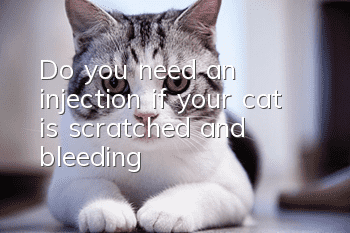Do you need an injection if your cat is scratched and bleeding?

Generally speaking, if you are scratched and bleeding by a cat, you do not need an injection, because there is no rabies virus in cat scratches, and the wound needs to be cleaned properly.
Do I need an injection if I am scratched by a cat and bleed?
Generally speaking, there is no problem if you are scratched by a cat, because the rabies virus will not be carried on the cat's claws. This type of virus requires high environmental requirements and is difficult to survive in the outside world. Rabies virus is usually found in animal body fluids, such as blood and saliva. If the owner encounters the following situation, he or she should pay attention. The owner is scratched by a virus-carrying cat, and the cat itself is also injured. Its blood just flows into the wound, so the owner may be infected. But this chance is very low.
If animals are infected with rabies, they can only transmit the virus to humans if they bite a few days before their onset of illness and before their death (they are not contagious during the incubation period), and this kind of animal will inevitably die after biting a human. . Therefore, if you are bitten by an animal and the animal does not die within 10 days, the possibility of being infected with rabies virus can be basically ruled out. If a cat does not go out, there is basically no chance of contracting rabies. The situation should be that there is no disinfection and the wound is slightly infected. It is recommended to use iodophor to disinfect the bite or scratch after being bitten or scratched by a cat. If it is only a minor injury, the wound will heal quickly. If the bite or scratch is severe, consider going to the hospital for a tetanus shot.
What to do if a cat scratches you and bleeds
1. First find the water source. Be sure to rinse the wound with running water to wash away the virus and squeeze out the blood. Then wipe the wound with iodine and disinfect it. Finally, use alcohol to wash off the iodine and disinfect with alcohol.
2. Immediately go to the local epidemic prevention department to get vaccinated. The incubation period of rabies is as fast as 10 days before onset of symptoms, and as slow as several years.
3. If the scratch is serious, antiviral serum must be injected and used together with the vaccine. However, antiviral serum may cause allergies, so you must first try the injection under the guidance of a doctor.
4. When bleeding occurs after being scratched by a cat, as long as the bleeding is not severe, do not rush to stop the bleeding and let the blood drain properly. Because pathogenic bacteria that enter the wound can be brought out through bleeding; if the wound is small and superficial, you can apply 75% alcohol or 2% iodine tincture and disinfect it 2 to 3 times, and wait until the bleeding stops naturally; if If the wound is deep and has a large area, you can use sterile saline or 0.1% hydrochloric acid to rinse the wound repeatedly and thoroughly. To prevent rabies, rinse the wound for at least half an hour and then apply 75% alcohol or 2% iodine tincture. Wounds are generally not suitable for bandaging and suturing.
How to prevent being scratched by a cat
1. Pay attention to pet hygiene in daily life, and do not have too close contact with pets, especially during the animal's estrus season. Pay special attention to keeping a distance from stray cats and dogs.
2. It is recommended that parents educate their children to avoid stray cats and dogs. Stray cats and dogs have a higher probability of carrying germs. They should not provoke cats and dogs that are eating or sleeping or looking at the cubs of animals.
3. People with congenital diseases, AIDS patients, those who have received organ transplants and those with low immunity are at high risk of infection and should consult a doctor before raising a cat.
4. If they are domestic pets, such as cats and dogs, it is best to take them to the pet hospital for a check-up before raising them to see if they have any diseases. If they are treated in time, there will be no It is best to get vaccinations to prevent diseases, and to take pets to the hospital for regular physical checkups to avoid contracting some diseases and transmitting them to humans.
- Kitten is active but sneezes
- Can cats eat salmon?
- Urine collection method for cat urine test, cat raising strategy!
- What should I do if my newly adopted kitten keeps meowing?
- How can a thin cat gain weight? Learn about the guide to weight gain for cats!
- What is the meaning of cats in China?
- How often do newborn kittens defecate?
- How long does it take for a kitten to grow up?
- Can cats eat pomelo?
- Be careful about parasites when adopting stray cats



